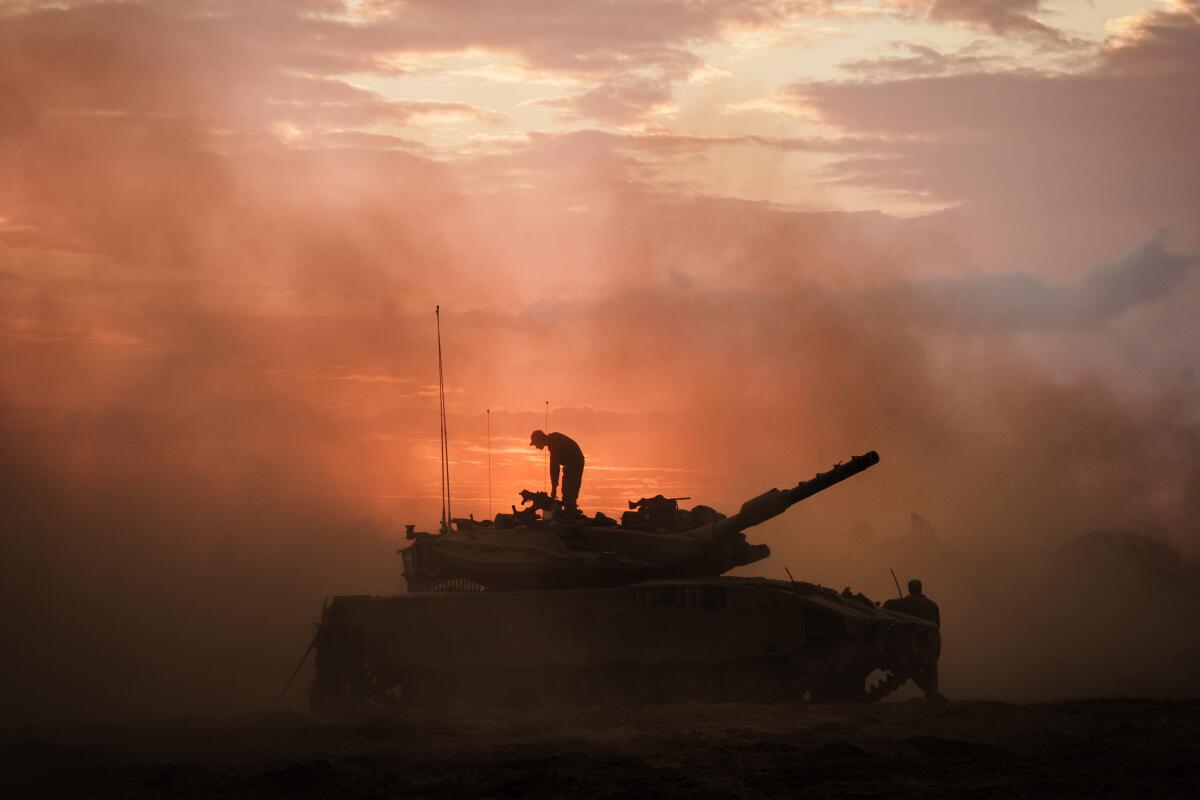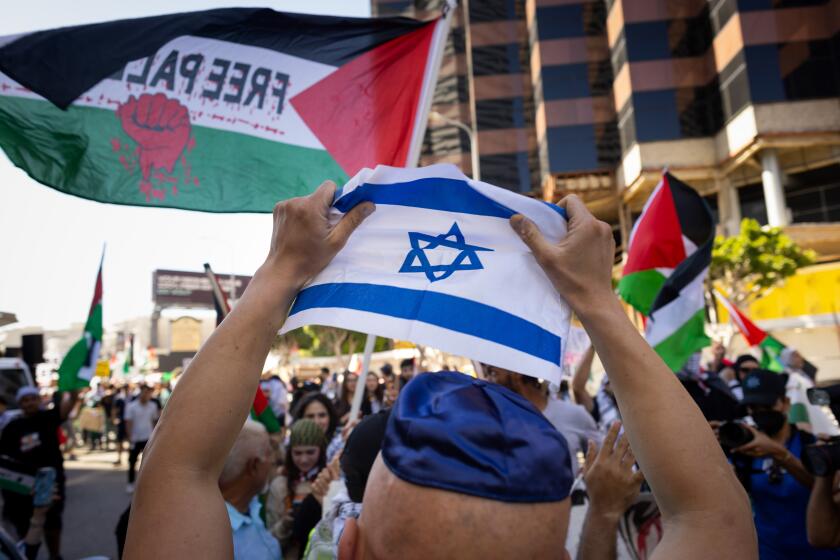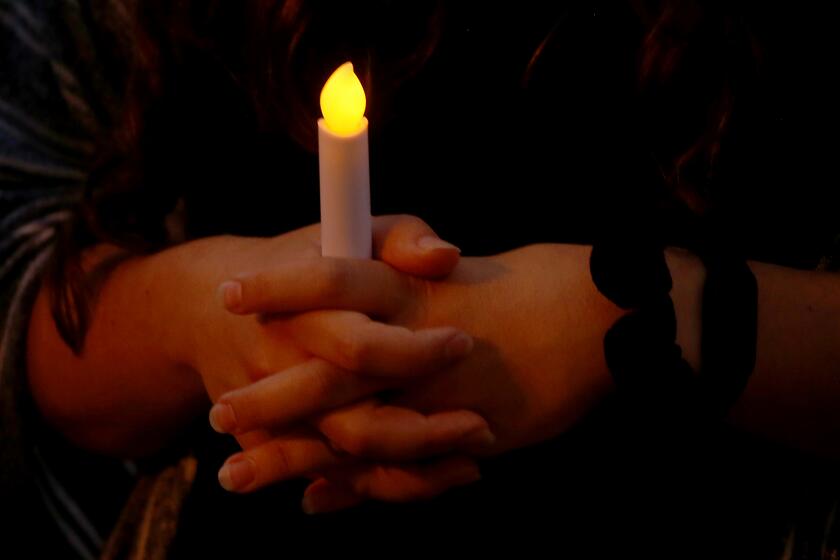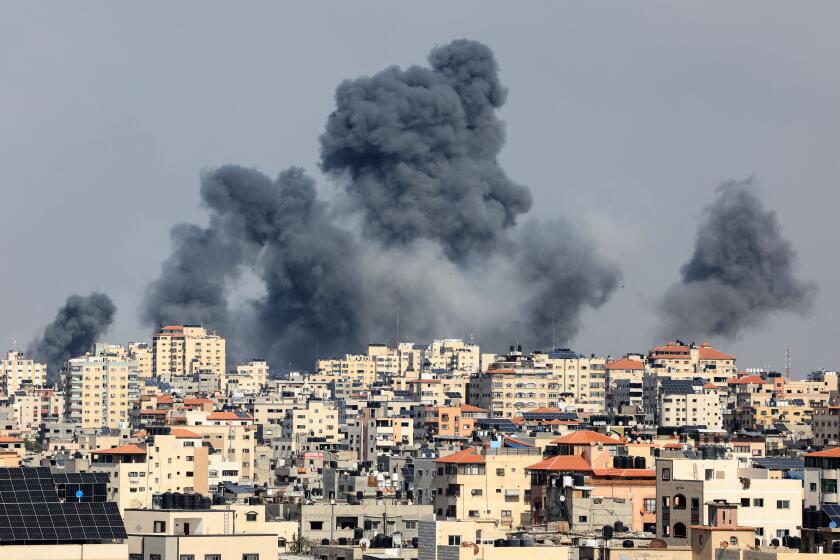Opinion: I’m a former U.S. diplomat who was stationed in Israel. I feel only empathy and pain

- Share via
During the two years I lived in Israel serving as a junior U.S. diplomat, I used many words to describe the country that I somewhat reluctantly called home. “Never boring” was my go-to, a useful euphemism when Israeli assertiveness exasperated me. “Achingly beautiful” was another, when I spent my weekends hiking through the abundance of spring wildflowers that fill the Golan and Galilee, the expanse of the Negev desert and the stark beauty of the wadis in the West Bank.
And complicated. So, so complicated.
Israel is all those things and more. It is a vivid, endlessly fascinating, often maddening country. A week after my 30th birthday and soon after I had arrived at my post in Tel Aviv, I worked the ceremony officially designating the new U.S. Embassy in Jerusalem. While Jared Kushner — somehow blissfully ignorant of the cognitive dissonance — spoke about how moving the embassy from Tel Aviv to Jerusalem would advance peace in the region, I refreshed my phone every few minutes, watching the death toll rise as the Israeli Defense Forces clashed with protesters at the Gaza/Israel border. I fought back tears. This wasn’t the good I had imagined the U.S. doing in the world.
Our close connection does not mean we agree on all aspects of the catastrophic situation in the Middle East. But the path to peace starts by not selectively grieving only those with whom we share religion or national origin.
Before arriving to Israel, I received seven months of Hebrew language instruction. Once, my instructor made an offhand comment that of the 20-some students she had graduated high school with, a quarter hadn’t lived to middle age. They’d been killed serving in the army, or as a victim of a terrorist attack, or in a bus bombing or stabbing.
In Israel, I came to think of my role as a diplomat as one that asked me to understand the countries I served in, without necessarily liking everything about them. When I was confronted with the indignities the Israeli government imposes on Palestinians — the onerous checkpoints, the imposed water scarcity, the military raids, the countless restrictions of residency permits — I often thought back to her comment.
It seems so obvious that all these policies breed resentment, creating a vicious cycle. But taking a chance on coexistence doesn’t seem so desirable when faced with the obituaries of your classmates. Or when it’s your child who will go to the front line if a war breaks out. Or when you’ve lived with the very real possibility that a terrorist might blow up the bus that you, your partner or your best friend is riding. Who among us would choose a path that might risk the lives of everyone we love?
After the attack in Israel, my Facebook feed filled with funeral announcements and pleas for information. But I also see friends frame it as anti-colonial resistance.
I realized last week that the only way we can process all the world’s pain and suffering is if we remove ourselves from it. But I can’t this time. I hear reports of families murdered in their homes, of young people flush from a night of music and dancing hunted and killed, of the sheer terror the kidnapped children must feel knowing that they will likely die without ever seeing their parents again. They are not abstractions. In my mind they are my friends, my classmates, my neighbors. I know this region too well to disengage.
But instead of universal, unqualified horror at the terror wreaked by Hamas, some observers have essentially responded “What did you expect? After everything that Israel has done to the Palestinians, violence is the only option available.” But if Palestinians are victims of their circumstances, so too is Israel. It has faced a Faustian bargain, being in immediate proximity to groups whose stated raison d’etre is to wipe it off the face of the earth.
As Israel is poised for a ground invasion of Gaza, and bombing continues, people fear that the goal is to empty the place of Palestinians.
What are Israel’s choices? Option 1: Prioritize the physical security of your citizens above all else, including the well-being of Palestinian civilians who bear you no ill will. Option 2: Attempt coexistence with the forces who bombed your buses.
Americans are hardly in a position to preach turning the other cheek. When terrorists killed 2,977 people on U.S. soil, we responded by invading two countries, with widespread public support. Years ago, with the memories of slain compatriots ever present, Israel chose Option 1. It’s an awful choice, born out of fear. And the more time passes, the tighter the restrictions, the greater the resentment — the more it seems impossible to reverse course.
Both Israelis and Palestinians have alternately been victim and aggressor in this conflict. It’s easy to pass judgment from the outside, to use words like “apartheid” with a sense of self-righteousness. But from the inside? I feel only empathy and pain, so much pain. For the children who didn’t get to grow up. For the people who want peace but don’t know how to reach it.
Jessica Kuntz served as a U.S. diplomat from 2017 through the summer of 2023, with assignments in Tel Aviv, the Bureau of International Organization Affairs and London. The views expressed are her own.
More to Read
A cure for the common opinion
Get thought-provoking perspectives with our weekly newsletter.
You may occasionally receive promotional content from the Los Angeles Times.













